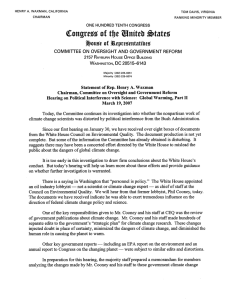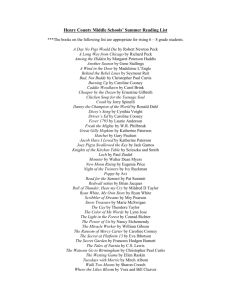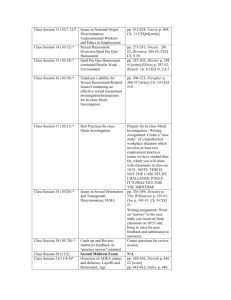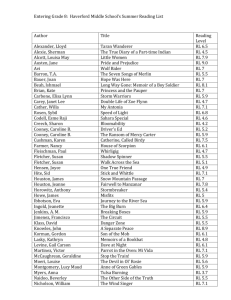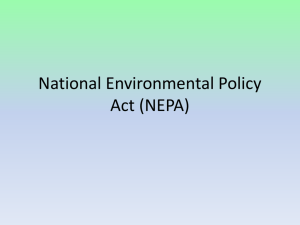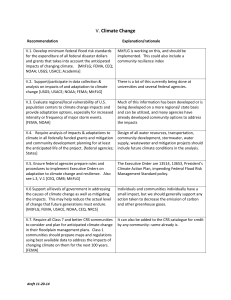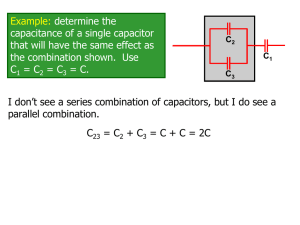Congree'e' of toe INniteb Btatesi p)ouee of faepreeentattbee 5-6143
advertisement
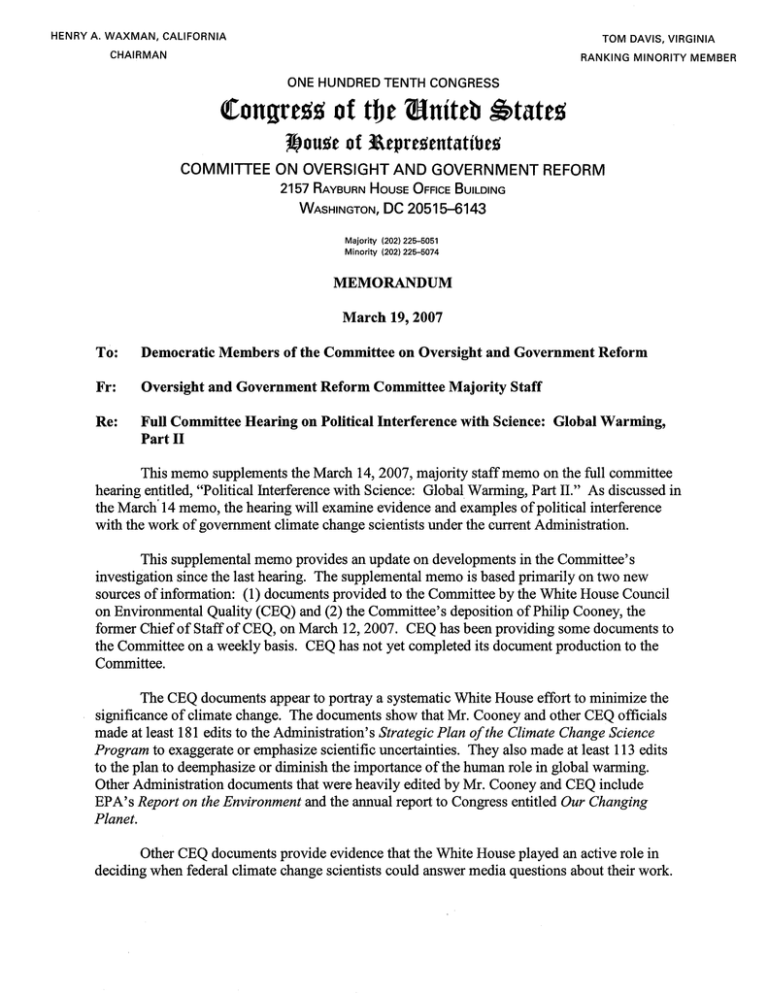
HENRY A. W A X M A N , CALIFORNIA T O M DAVIS, VIRGINIA CHAIRMAN RANKING MINORITY MEMBER ONE HUNDRED TENTH CONGRESS Congree'e' of toe INniteb Btatesi p)ouee of faepreeentattbee COMMITTEE ON OVERSIGHT AND GOVERNMENT REFORM 2157 RAYBURN HOUSE OFFICE BUILDING WASHINGTON, DC 20515-6143 Majority (202) 225-5051 Minority (202) 225-5074 MEMORANDUM March 19,2007 To: Democratic Members of the Committee on Oversight and Government Reform Fr: Oversight and Government Reform Committee Majority Staff Re: Full Committee Hearing on Political Interference with Science: Global Warming, Part I1 This memo supplements the March 14,2007, majority staff memo on the full committee hearing entitled, "Political Interference with Science: Global Warming, Part 11." As discussed in the W arch' 14 memo, the hearing will examine evidence and examples of political interference with the work of government climate change scientists under the current Administration. This supplemental memo provides an update on developments in the Committee's investigation since the last hearing. The supplemental memo is based primarily on two new sources of information: (1) documents provided to the Committee by the White House Council on Environmental Quality (CEQ) and (2) the Committee's deposition of Philip Cooney, the former Chief of Staff of CEQ, on March 12,2007. CEQ has been providing some documents to the Committee on a weekly basis. CEQ has not yet completed its document production to the Committee. The CEQ documents appear to portray a systematic White House effort to minimize the significance of climate change. The documents show that Mr. Cooney and other CEQ officials made at least 181 edits to the Administration's Strategic Plan of the Climate Change Science Program to exaggerate or emphasize scientific uncertainties. They also made at least 113 edits to the plan to deemphasize or diminish the importance of the human role in global warming. Other Administration documents that were heavily edited by Mr. Cooney and CEQ include EPA's Report on the Environment and the annual report to Congress entitled Our Changing Planet. Other CEQ documents provide evidence that the White House played an active role in deciding when federal climate change scientists could answer media questions about their work. I. CEQ EDITS TO GLOBAL WARMING REPORTS The CEQ documents and the deposition of Mr. Cooney reveal that Mr. Cooney and other CEQ officials made extensive edits to at least three important Administration documents addressing global warming: (1) the Strategic Plan for the Climate Change Science Program, (2) EPAYsReport on the Environment, and (3) the fiscal year 2003 edition of Our Changing Planet, an annual report to Congress. A. Strategic Plan of the Climate Change Science Program In July 2003, the Administration released a document entitled Strategic Plan for the Climate Change Science Program to guide research into the effects of climate change. The importance of the Strategic Plan was described by the National Research Council: The issues addressed by the U.S. Climate Change Science Program (CCSP) are among the most crucial of those facing humankind in the twenty-first century. ... [Sletting new strategic directions for the CCSP is particularly important. This new program must complement the research of the last decade, which focused on building an understanding of the Earth system, with research to explicitly support decision making. To do so, it will be necessary to continue research into the physical, chemical, and biological aspects of climate and associated global changes, and to add research that will enable decision makers to understand the potential impacts ahead and make choices among possible response strategies. ' The Committee has obtained numerous drafts of the Strategic Plan. These drafts have been extensively edited by CEQ, primarily by Mr. Cooney. The edits have the effect of exaggerating or emphasizing scientific uncertainties, deemphasizing the human role in global warming, inserting references to the possible benefits of climate change, removing references to taking action to combat global warming based on the science, and removing references to the National Assessment of the Potential Consequences of Climate Variability and Change. In four rounds of CEQ edits to the Strategic Plan, Mr. Cooney and Brian Hannegan of CEQ made at least 181 edits that had the effect of exaggerating or emphasizing scientific uncertainties related to global warming2 Dozens of these edits were reflected in the final version of the Strategic Plan. For example: The October 21,2002, draft read: "Warming temperatures will also affect Arctic land area^."^ Mr. Cooney replaced the certainty of "will" with the uncertainty of "may." National Research Council, Implementing Climate and Global Change Research: A Review of the Final U S . Climate Change Science Program Strategic Plan (2004). These drafts are dated October 28,2002, May 30,2003, June 2,2003, and June 16, 2003. Draft of Strategic Plan for the Climate Change Science Program at 20 (Oct. 21,2002) (Bates # 791). With his edit, the sentence read: "Warming temperatures may also affect Arctic land area^."^ The May 28,2003, draft read: "recent warming has been linked to longer growing seasons.. ., grass species decline, changes in aquatic diversity, and coral bleachingm5 Mr. Cooney inserted the words "indicated as potentially," so that the sentence read: "recent warming has been indicated as potentially linked to growin seasons.. ., grass species decline, changes in aquatic diversity, and coral bleaching."' This edit introduces a sense of uncertainty that is not present in the original draft prepared by government scientists. The June 5,2003, draft read: "Climate modeling capabilities have improved dramatically in recent years and can be expected to continue to do so. As a result, scientists are now able to model Earth system processes and the coupling of those processes on a regional and global scale with increasing precision and reliability."7 CEQ eliminated these sentences from the draft8 In the four rounds of CEQ edits to the Strategic Plan, Mr. Cooney and Brian Hannegan of CEQ also made at least 113 edits that deemphasized or diminished the importance of the human role in global warming. Dozens of these changes were reflected in the final version of the Strategic Plan. For example: The October 21,2002, draft read: "Moreover, model simulations that incorporate a full suite of natural and anthropogenic forcings have demonstrated that the observed changes over the past century are consistent with a significant contribution from human activity."g Mr. Cooney replaced "demonstrated" with "indicated" and inserted a "likely." These edits had the effect of minimizing the human contribution to global warming. The resulting sentence read: "Moreover, model simulations that incorporate a full suite of natural and anthropogenic forcings have indicated that the observed changes over the past century are likely consistent with a significant contribution from human activity."10 Id. Draft of Strategic Plan for the Climate Change Science Program at 8-5 (May 28, 2003) (Bates # 798). Id. Draft of Strategic Plan for the Climate Change Science Program at 294 (June 5,2003) (Bates # 363). Id. Draft of Strategic Plan for the Climate Change Science Program at 63 (Oct. 21,2002) (Bates # 791). lo ~ d. The June 2,2003, draft defined "mitigation" to mean "an intervention to reduce the causes or effects of human-induced change in climate."" CEQ's edits eliminated the phrase "human-induced" fi-om this definition. l2 CEQ also inserted references to the possible benefits of climate change. For example, the June 2,2003, draft read: "Identify ecological systems susceptible to abrupt environmental changes with potentially severe impacts on goods and services."13 This statement expressed clear concerns about the economic effects of global warming. CEQ replaced "severe" with "significant (positive or negative)." As a result, the draft stated: "Identify ecological systems susceptible to abrupt environmental changes with potentially significant (positive or negative) impacts on goods and ser~ices."'~ Unlike the original statement, this revised statement did not seem to raise the same concerns about the economic effects of global warming. In addition, CEQ removed references to taking action to combat global warming based on the science. For instance, the June 16,2003, edits removed five references to "decision-relevant" or "policy-relevant" information.15 In a document listing all of the edits that CEQ made on that date, CEQ commented: "payoff is improved understanding, not enabling of actions."16 Finally, CEQ successfully removed nine references to the National Assessment of the Potential Consequences of Climate Change fi-om various drafts of the Strategic Plan. At the last climate change hearing, Rick Piltz, formerly a Senior Associate at the Climate Change Science Program, testified that the National Assessment, which was released in 2000, is "the most comprehensive and authoritative scientifically based assessment of the potential consequences of climate change for the United states."17 According to the National Academy of Sciences, the National Assessment represents "the current standard for comprehensive regional and sectoral analyses of the potential impacts of climate change for the United states.'"' Mr. Cooney was asked about the deletions of the references to the National Assessment in his deposition. Mr. Cooney testified that he thought that a legal settlement agreement between l1 Draft of Strategic Plan for the Climate Change Science Program at 3 (June 2,2003) (Bates # 363). l2 Id. l 3 Draft of Strategic Plan for the Climate Change Science Program at 168 (June 2, 2003) (Bates # 363). l4 ~ d. l 5 Draft of Strategic Plan for the Climate Change Science Program (June 2,2003 and June 5,2003) (Bates # 363). l6 ~ d. l7 House Committee on Oversight and Government Reform, Hearings on Political Interference with Science: Global Warming (Jan. 30,2007). '*National Research Council, Analysis of Global Change Assessments: Lessons Learned (Feb. 2007). the Bush Administration and the oil industry funded Competitive Enterprise Institute prohibited the Administration from mentioning the National Assessment in the Strategic plan. l 9 However, he also testified that he did not speak with the Department of Justice about the meaning of the settlement agreement and did not "really know what it absolutely requires and absolutely doesn't."20 In his deposition, Mr. Cooney also stated that CEQ's edits were merely recommended changes that could be accepted or rejected by Dr. James Mahoney, the Director of the Climate Change Science Program. According to the CEQ documents, however, Mr. Cooney signed a "concurrence sheet" before the release of the final document. This concurrence sheet stated that Mr. Cooney "approved" the Strategic B. Report on the Environment The Committee has also obtained new information regarding CEQ's edits to EPA's Report on the Environment. This report was released in draft form by EPA in June 2003 for public comment. The report was supposed to be EPA's "first-ever national picture of the U.S. en~ironment."~~ The goal of the report was to describe "what EPA knows - and doesn't know - about the current state of the environment at the national level, and how the environment is changing.'"3 CEQ has provided the Committee with copies of Mr. Cooney's handwritten edits to a draft of the EPA report.24 In these edits, Mr. Cooney deleted uncontroversial statements about the knowledge of climate change. For example, he deleted the statement, "Climate change has global consequences for human health and the environment." Additionally, he deleted a sentence that quoted fi-om the National Academy of Sciences: The NRC [National Research Council] concluded that "Greenhouse gases are accumulating in the atmosphere as a result of human activities, causing surface air temperatures and subsurface ocean temperatures to rise." Mr. Cooney replaced this sentence with a sentence that leaves the reader wondering about the significance of human activities: I9 Committee on Oversight and Government Reform, Deposition of Philip Cooney at 97 (Mar. 12,2007). 21 Id. at 57, 61,73, 74, 82, 132, 146 151-152, 156-157; Bates # 1484. 22 Environmental Protection Agency, Draft Report on the Environment (June 2003). 23 Id. 24 Environmental Protection Agency, Draft Report on the Environment, Global Issues Section (Apr. 11,2003). Some activities emit greenhouse gases and other substances that directly or indirectly may affect the balance of incoming and outgoing radiation, thereby potentially affecting climate on regional and global scales.25 Mr. Cooney also deleted any reference to average surface temperature reconstructions, which indicate that temperatures have been rising over the past 1000 years. Moreover, he included a reference to a study funded by the American Petroleum Institute that disputes the judgment of the National Academy of Sciences and the Intergovernmental Panel on Climate CEQ produced a copy of a cover sheet that accompanied a set of Mr. Cooney's edits to the draft EPA report. On this cover sheet, Mr. Cooney wrote, "These changes must be made."27 During his deposition, Mr. Cooney confirmed that he wrote this comment and acknowledged that "the language is mandatory."28 He further testified: "If they want to publish, they need to respond, to engage our comments. And so it was my way of getting Alan Hecht [an EPA employee detailed to work at CEQ] something to go back to the Agency with and say, you have got to engage their comment^.'"^ The Committee has also been provided a copy of a June 2003 EPA memo, in which EPA staff described three options for responding to CEQYsextensive edits to the Report on the Environment from which the EPA Administrator could choose. Option 1 was for the EPA Administrator to accept the CEQ and OMB edits. While EPA staff noted t h s was the "easiest" course of action, they also cautioned that "EPA will take responsibility and severe criticism from the science and environmental community for poorly representing the ~cience."~'According to the EPA staff, the edited report "undercuts" the National Research Council and the Intergovernmental Panel on Climate change." EPA staff furfher warned that the edited report 'provides specific text to attack" and creates the 'potential to extend the period of criti~ism."'~ The second option that EPA staff outlined for the EPA Administrator was to remove the climate change section entirely from the Report on the Environment. The benefits of this approach, according to EPA staff, were that it would provide "little content for attacks on EPA7s 25 Id. 26 Id. 27 Cover Sheet (undated) (WH 6, EPA Draft Report on the Environment). House Committee on Oversight and Government Reform, Deposition of Philip Cooney at 159-160 (Mar. 12,2007). 28 29 Id. at 160. Environmental Protection Agency, Summary Issues Surrounding Presentation of Climate Change: EPA 's Draft Report on the Environment (undated) (WH 22, EPA Draft Report on the Environment). 30 31 Id. 32 Id, science" and it '"may be the only way to meet both WH and EPA needs."33 EPA staff expressed concern that "EPA will take criticism for omitting climate change" from the report.34 The third option for the EPA Administrator was to refuse to accept the White House's "no further changes" direction and try to reach compromise.35 EPA staff seemed to prefer this approach, stating that it was the "only approach that could produce a credible climate change ~~ they warned, this course of action could section" in the Report on the ~ n v i r o n m e n t .However, "antagonize the White House" and "it is likely not feasible to negotiate agreeable text."37 In the end, EPA Administrator Whitman took the second option and deleted the discussion of climate change when the Report on the Environment was released in draft form for public comment. During his deposition, Mr. Cooney testified that he believed that CEQ Chairman Connaughton personally met with then-EPA Administrator Whitman to resolve the disagreements between CEQ and EPA regarding the edits. According to Mr. Cooney, "Governor Whitman made the decision to remove the 5-page summary on climate change ~cience."'~ EPA never issued a final version of the Report on the Environment. C. Our Changing Planet A third climate change document edited by Mr. Cooney and CEQ is the fiscal year 2003 edition of Our Changing Planet, an annual report to Congress. The Our Changing Planet report was the Administration's primary communication to Congress about the status of the U.S. Climate Change Science Program. This document provided the basis for congressional oversight and budget planning. The Committee has obtained a November 4,2002, memorandum from Dr. Mahoney and Dr. Richard Moss of the Climate Change Science Program to Mr. Cooney. The subject line of this memorandum reads: "Response to CEQ Review Comments on FY 2003 'Our Changing la net."'^^ In the memorandum, Dr. Mahoney and Dr. Ross explain: We have accepted and included in the final text about 80 percent of the approximately 110 revisions proposed by CEQ to "Our Changing Planet." .. . These revisions have been 33 Id. 34 Id. 35 Id. 36 Id. 37 Id. House Committee on Oversight and Government Reform, Deposition of Philip Cooney at 140 (Mar. 12,2007). 38 39 Memorandum from Jim Mahoney and Richard Moss, Climate Change Science Program, to Phil Cooney, Council on Environmental Quality (Nov. 4, 2002) (Bates # 799). incorporated verbatim except for a few minor instances of editing for syntax and stylistic consistency. However, we have concerns about some of the proposed revision^.^' The memorandum then discusses a number of problematic edits. For example, the initial draft read: "Reducing the scientific uncertainty in global climate models could .. . provide information essential to projecting the impacts of climate change on ecosystems.'74 Mr. Cooney changed the statement to: "Reducing the scientific uncertainty in global climate models could .. . in the long run provide information on the potential impacts of climate change on ecosystems."42 This edit made climate models seem less useful than they are and climate change less certain than it is. It also implied that global climate models would not provide useful information for a long period of time. Dr. Mahoney and Dr. Ross responded to this edit by stating: "Not just 'in the long run.' Research is already providing meaningful information on potential impacts of climate change on ecosystems."43 The phrase "in the long run" appeared in the final text of the report. In another case, Dr. Mahoney and Dr. Ross wrote: "The proposed deletion would produce a less accurate and less balanced summary of the key research issues as identified by the Yet the deleted paragraph does not appear in the final NRC [National Research ~ouncil].'*~ version of Our Changing Planet. In several other cases, Mr. Cooney wrote "no" in the margin next to the alternative wording provided by Dr. Mahoney and Dr. Ross. 11. CEQ SCREENING AND MONITORING PRESS CONTACTS WITH SCIENTISTS The Committee has also obtained information indicating that CEQ staff in the White House screened and monitored press contacts with government climate scientists. In a June 11,2005, email, an environmental reporter requested an interview with a NOAA scientist "about how climate change science has become politicized."45 In a second June 11,2005, email, the scientist responded that the reporter would need to ask the NOAA press c~ordinator.~~ 40 Id. 41 Id. 42 Id. (underlining added). 43 Id. 44 Id. 45 Email to V. Ramaswamy, National Oceanic and Atmospheric Administration (June 11,2005). 46 Email from V. Ramaswamy, National Oceanic and Atmospheric Administration (June 11,2005). Two days later, in a June 13,2005, email, a NOAA press officer wrote to Michele St. Martin of CEQ. The press officer expressed concern that the reporter "may fish for the answers she's looking for," but noted that the NOAA scientist "knows his boundarie~."~He then asked for White House instructions by the end of the day. A follow-up email from the NOAA press officer stated, "if we have CEQ approval to go ahead, then that would be good."48 In another June 13,2005, email, the NOAA press officer reported that "CEQ and OSTP [the White House Office of Science and Technology Policy] have given the green light for the inter vie^."^^ In this email, which was sent to a second NOAA public affairs officer, the press officer stated that Ms. St. Martin "wants me to monitor the call and report back to her when it's done."50 These emails occurred a few days after Mr. Cooney left CEQ. During his deposition, Mr. Cooney confirmed that CEQ was directly involved in screening press requests to interview government scientists. He testified: "Our communications people would render a view as to whether someone should give an interview or not or who it should be."51 He also testified: "I was -may have been involved."52 However, Mr. Cooney said that he did not recall being aware of Ms. St. Martin telling NOAA to monitor press calls and report back to C E Q . ~ ~ Email from Kent Laborde, National Oceanic and Atmospheric Administration, to Michele St. Martin, Council on Environmental Quality, and Jordan St. John, National Oceanic and Atmospheric Administration (June 13,2005). 47 48 Email from Kent Laborde, National Oceanic and Atmospheric Administration (June 13,2005). 49 Email from Kent Laborde, National Oceanic and Atmospheric Administration, to Jana Goldman, National Oceanic and Atmospheric Administration (June 13,2005). 50 Id. 51 House Committee on Oversight and Government Reform, Deposition of Philip Cooney at 162 (Mar. 12,2007). 52 ~ dat. 161. 53 Id. at 163
